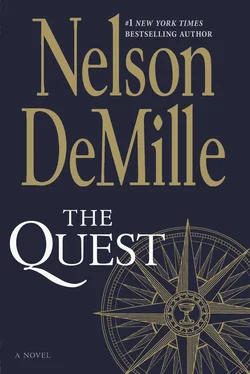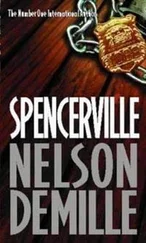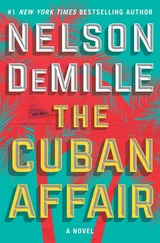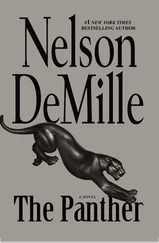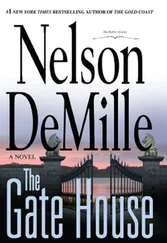Nelson Demille - The Quest
Здесь есть возможность читать онлайн «Nelson Demille - The Quest» весь текст электронной книги совершенно бесплатно (целиком полную версию без сокращений). В некоторых случаях можно слушать аудио, скачать через торрент в формате fb2 и присутствует краткое содержание. Год выпуска: 2013, ISBN: 2013, Издательство: Center Street, Жанр: Триллер, на английском языке. Описание произведения, (предисловие) а так же отзывы посетителей доступны на портале библиотеки ЛибКат.
- Название:The Quest
- Автор:
- Издательство:Center Street
- Жанр:
- Год:2013
- ISBN:1455576425
- Рейтинг книги:5 / 5. Голосов: 1
-
Избранное:Добавить в избранное
- Отзывы:
-
Ваша оценка:
- 100
- 1
- 2
- 3
- 4
- 5
The Quest: краткое содержание, описание и аннотация
Предлагаем к чтению аннотацию, описание, краткое содержание или предисловие (зависит от того, что написал сам автор книги «The Quest»). Если вы не нашли необходимую информацию о книге — напишите в комментариях, мы постараемся отыскать её.
The Quest — читать онлайн бесплатно полную книгу (весь текст) целиком
Ниже представлен текст книги, разбитый по страницам. Система сохранения места последней прочитанной страницы, позволяет с удобством читать онлайн бесплатно книгу «The Quest», без необходимости каждый раз заново искать на чём Вы остановились. Поставьте закладку, и сможете в любой момент перейти на страницу, на которой закончили чтение.
Интервал:
Закладка:
Also, he realized that Henry had already thought some of this out. They couldn’t just head off into the jungle and expect to run into the black monastery. Few people had been so lucky, and those who had, like Father Armano and his army patrol, had discovered that their luck had run out at the monastery-or before then, when they met the Gallas. And now General Getachu was also interested in the monastery.
So, yes, they should do aerial recon to see if they spotted anything that looked like a black monastery-or like something they didn’t want to run into on the ground.
Mercado glanced at his watch and said, “We’ll go back to the library, then over to the Ethiopian College.”
“Are you taking the day off?”
“No. I’m working. And so are you.”
“Right. I work here.” Purcell asked, “When do I get my creds?”
“In a week or two. Or three.” He smiled. “This is not Switzerland.” He said, “After you left my office the other night, I sent a telex to the British Foreign Office, who have taken responsibility for the repatriation of Colonel Sir Edmund Gann. I asked them to have Gann call or telex me at my office.”
“Good.”
“Have you written to Vivian?”
In fact, he had after he’d left Mercado’s office that night and returned to the Hotel Forum. The letter had said, simply, “I am in Rome, staying at the Forum. Henry is here, working for L’Osservatore Romano, and we have met and spoken. We would like you to join us in Rome, before Christmas if possible. We are discussing the possibility of returning to Ethiopia, and we would like to include you in those discussions if you are still interested. Please telex me at the Forum either way. Hope you are well. Frank.”
He’d felt that the letter, like his last, was a bit distant, and he wanted her to respond, so he’d added a P.S.: “I have been very lonely without you.”
“Frank?”
“Yes… I wrote to her. Posted it yesterday morning.”
“Hopefully the Italian postal service is not on strike this week.” He joked, “Half of Paul’s letters to the Romans are still sitting in the Rome post office.”
Purcell smiled. “I actually sent it from the Swiss post office here.”
“Excellent thinking. It should be in Geneva today.” He stood. “Ready?”
Purcell stood and they walked back to the library.
Mercado informed Purcell, “There are over half a million printed volumes in this library, and over fifty thousand rare manuscripts, including many in the hand of Cicero, Virgil, and Tacitus.”
“So no coffee allowed.”
Mercado continued, “It would take a lifetime to read just the handwritten manuscripts, let alone the printed volumes.”
“At least.”
“In any case, after a month of research, I have no documentary evidence of how the Grail, which was bound for the Holy Land, wound up in Ethiopia. But I have a theory.” He said to Purcell, “If you know your history, you will know that the Council of Chalcedon was called in A.D. 451 to try to resolve some of the theological differences that existed in the early Christian Church.”
“Right.”
Mercado continued, “The pope, Leo I, and the Christian emperor of the Eastern Roman Empire, Marcian, had a disagreement with the Egyptian and Ethiopian emissaries to this meeting because these emissaries refused to accept the complex doctrine of the Trinity and insisted that Christ was one and that he was wholly divine. These emissaries were expelled, and the dissenting churches came to be called Egyptic, and later Coptic, and this was the beginning of Ethiopia’s isolation from the larger Christian world, which persists to this day.”
“I noticed.”
“In any case, the missing piece of the journey of the Grail could be this-Perceval and Gauvain-”
“Who we last saw sailing off in a fog.”
“Reached the Holy Land, which was part of the Eastern Roman Empire, ruled by the emperor in Constantinople.” He continued, “Perceval and Gauvain would have given the Grail to the Christian bishop in Jerusalem, who was at that time a powerful figure in the church.” He informed Purcell, “There is some documentary evidence here in the archives that the Grail was circulated among the important Christian churches in Jerusalem over the next few centuries.”
Mercado continued, “But in A.D. 636, Jerusalem was conquered by the armies of Islam, and many important Christian religious objects were lost or were spirited away to Rome, Constantinople, and Alexandria, Egypt, which was still part of the Eastern Roman Empire.”
“How’d it wind up in Ethiopia, Henry?”
“I’m speculating that the Grail wound up in Alexandria, or someplace else in Egypt, and six years later, in 642, Christian Egypt fell to Islam. I’m further speculating that the Grail, now in the possession of Coptic priests or monks in Egypt, was taken by Nile riverboat to Ethiopia for safekeeping in Axum.” He explained, “That would make sense, historically, geographically, and in terms of theology-the Egyptians were Copts, and they came into possession of the Grail from Christian refugees from Jerusalem who were fleeing Islam. Six years later, they themselves were conquered by Islam, and they needed to safeguard the Grail, so they took it by a safe route on the Nile to their co-religionists in Ethiopia.”
“That’s an exciting story.”
“And based on known historical events. Also, after this time, there are historical references to the Holy Grail in Ethiopia-and no references to it being anywhere else.”
Purcell did not respond.
“I’m not asking you to suspend belief. I’m trying to fill in the blanks between when the Grail left Glastonbury and when it is mentioned in primary source documents as being in Ethiopia.”
A far simpler explanation, Purcell thought, was that the cup used by Christ at the Last Supper had never left Jerusalem. But the Brits liked their story of King Arthur and the Knights of the Round Table and the Holy Grail, and people like Mercado worked it into the legend. In the end, it didn’t matter how it got to Ethiopia, assuming it did, and assuming it existed.
Purcell said, “You understand, Henry, that we are not trying to locate the Holy Grail or even figure out how it got to Ethiopia. We have been told by a credible source-Father Armano-that it’s sitting in the black monastery. Now all we have to do is go find this place.”
“And I’ve explained to you that our journey-spiritual and intellectual-begins here.”
“I’m not arguing with you, Henry. I just want this part of the journey to end before lunch.”
“If we do find the Grail, it would be important if we could establish its provenance, as you would do with any ancient object-to establish its authenticity.”
“If we find the Grail, Henry, we will know it is authentic. Especially if it has a lance dripping blood into it. And even if it doesn’t, we will know it when we see it. We will feel it. That much I believe. And that’s what you should believe. So it doesn’t matter how it got there, and we don’t have to prove anything to anyone.” He said, “Res ipsa loquitur. The thing speaks for itself.”
Mercado looked at him and said, “I didn’t know you spoke Latin.”
“Neither did I.”
Both men stayed silent. Then Mercado asked, “But did I make my case?”
“You did an excellent job.” He asked Mercado, “Did you do all this on company time? Or are you doing it for the company?”
Mercado did not reply.
Purcell closed his notebook and said, “Well, I have enough to write the story. Now let’s find the black monastery so I can write the end.”
Purcell stood, and Mercado said to him, “For a writer, a journey of a thousand miles begins in a library and ends at the typewriter.”
Читать дальшеИнтервал:
Закладка:
Похожие книги на «The Quest»
Представляем Вашему вниманию похожие книги на «The Quest» списком для выбора. Мы отобрали схожую по названию и смыслу литературу в надежде предоставить читателям больше вариантов отыскать новые, интересные, ещё непрочитанные произведения.
Обсуждение, отзывы о книге «The Quest» и просто собственные мнения читателей. Оставьте ваши комментарии, напишите, что Вы думаете о произведении, его смысле или главных героях. Укажите что конкретно понравилось, а что нет, и почему Вы так считаете.
